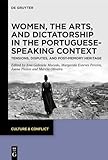Women, the Arts, and Dictatorship in the Portuguese-Speaking Context : Tensions, Disputes, and Post-Memory Heritage / ed. by Ana Gabriela Macedo, Margarida Esteves Pereira, Joana Passos, Márcia Oliveira.
Material type: TextSeries: Culture & Conflict ; 27Publisher: Berlin ; Boston : De Gruyter, [2024]Copyright date: 2024Description: 1 online resource (VIII, 220 p.)Content type:
TextSeries: Culture & Conflict ; 27Publisher: Berlin ; Boston : De Gruyter, [2024]Copyright date: 2024Description: 1 online resource (VIII, 220 p.)Content type: - 9783110783377
- 9783110783483
- 9783110783421
- African literature (Portuguese) -- Women authors -- History and criticism
- Arts -- Political aspects -- Portuguese-speaking countries
- Brazilian literature -- Women authors -- History and criticism
- Portuguese literature -- Women authors -- History and criticism
- Women artists -- Portuguese-speaking countries -- History -- 20th century
- Women artists -- Portuguese-speaking countries -- History -- 20th century
- Arts
- Dictatorship
- Feminism
- Literature
- Post-colonial studies
- LITERARY CRITICISM / European / General
- Arts
- dictatorship
- feminism
- post-colonial studies
- 700.82 23/eng/20240627
- N8354 .W65 2024
- online - DeGruyter
- Issued also in print.
| Item type | Current library | Call number | URL | Status | Notes | Barcode | |
|---|---|---|---|---|---|---|---|
 eBook
eBook
|
Biblioteca "Angelicum" Pont. Univ. S.Tommaso d'Aquino Nuvola online | online - DeGruyter (Browse shelf(Opens below)) | Online access | Not for loan (Accesso limitato) | Accesso per gli utenti autorizzati / Access for authorized users | (dgr)9783110783421 |
Frontmatter -- Table of Contents -- Introduction -- Experiment and Evidence -- Unfinished Heritages: Artistic Portuguese Post-Memory Conversations about Dictatorship and Colonial Heritage -- Postcolonial and Decolonial Feminisms: Archaeologies, Tensions, Disputes -- From Fiction to Activism: Rounding out the Memory of Maria Lamas -- Djaimilia Pereira de Almeida, The Telephones: A Tribute to the ‘Literary Genre of the Diaspora’ and the Reinvention of a Narrative Poetics -- Post-Utopia, Post-Conflict Literary Trends in Twenty-First-Century African Literatures: The Cases of Ana Paula Tavares and Conceição Lima -- An “Independent Spirit”: The Work of Sarah Affonso (1899–1983) and the Changing Cultural Terrain of Mid-Twentieth-Century Portugal -- Inventing a Language of Her Own: Writing in Teresinha Soares’ Artistic Practice -- Poetics of Survival: (Critical) Process and Archive in Rosana Paulino’s ¿História Natural? -- Bertina Lopes: Cartographic Notes on a Transnational Artist -- Archival images of the Estado Novo in Portuguese Film: A Gendered Perspective in Brandos Costumes (1975), Natal 71 (1999) and Natureza Morta (2005) -- Yvone Kane, Memory, Mourning, and Melancholia: Unresolved Pasts and “Lost Futures” -- List of Contributors -- Index
restricted access online access with authorization star
http://purl.org/coar/access_right/c_16ec
This book deals with the work of twentieth-century women artists and literary authors from Portugal, Brazil and Portuguese-speaking African countries against the backdrop of political dictatorships. The essays in this volume reflect upon and challenge canonical perspectives on the arts and literature, bringing to light some of the hidden and silenced faces of Lusophone culture. By doing so, they highlight how dominant ideologies marked the artistic and literary practices of Portuguese-speaking women, and how these women in turn developed strategies of resistance through their creative work. The volume brings together contributors working in a range of disciplines, including literary criticism, the visual arts, and film studies, all of whom reflect on themes such as the reactions of women artists to authoritarianism, the representations of political repression in their work, the colonial war, and the critical revision of this historical moment by a younger generation of artists. It addresses scholars, critics, students and cultural workers with an interest in post-colonial and feminist studies in the Portuguese-speaking context.
Issued also in print.
Mode of access: Internet via World Wide Web.
In English.
Description based on online resource; title from PDF title page (publisher's Web site, viewed 20. Nov 2024)


